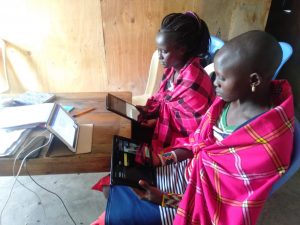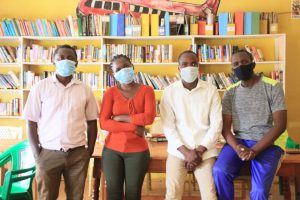The DRIVE project (Digital Reading for Inclusivity, Versatility and Engagement) was funded by the UKRI under its Digital Innovation for Development in Africa (DIDA) strand. Full details of the project can be found here. The second phase of this funding has been withdrawn following the UK Government’s revision of its ODA budget.
The project was led by BU Professor Bronwen Thomas, and Jess Ruddock (a PGR from FMC) was appointed as a Research Assistant from January onwards.
The project had to be substantially revised due to the COVID crisis. This meant all project meetings had to be held online but perhaps the biggest impact was on the digital storytelling part of the project. Initially, the plan was for DigiTales, a participatory media company based in the UK and Portugal to deliver a workshop in Nairobi, with 10-12 participants. Instead, we redesigned this part of the project, providing training for three Kenyan based facilitators to deliver the workshops in three different regions of Kenya – Nairobi, Chavakali (close to the Ugandan border) and Loita (home to Maasai tribespeople). Jess Ruddock also took part in the training. Following this we held three workshops in the different locations, producing 13 stories in total. The stories can be viewed on the project website. They represent a wide range of experiences, from Alan’s account of the stigma he suffered as a child in literature classrooms because of his visual impairment, to Faith’s account of the impact that the book Blossoms of the Savannah had on her as a young Maasai girl facing the prospect of female circumcision. In addition to learning how to create and produce digital stories, the participants were also given training on accessibility tools for the iPads that they received

Nalotwesha and Faith on a zoom call in Loita
Blog posts from one of the Nairobi participants, Alan Hebert, and from the Chavakali facilitator can also be found on the website, along with Jess Ruddock’s account of the training.

The Chavakali team
In addition to the digital stories, the project team produced a Toolkit for remote delivery of digital storytelling, co-authored by Kelvin Gwuma, Joseph Odhiambo and Scola Leuka, the three newly-trained facilitators. The Toolkit is available to view or download from the project website here along with video case studies produced by the facilitators. The website also features a preliminary project evaluation reflecting on the main findings and impact of the project so far, and how we managed to meet our objectives despite all the obstacles we faced.











 SPROUT: From Sustainable Research to Sustainable Research Lives
SPROUT: From Sustainable Research to Sustainable Research Lives BRIAN upgrade and new look
BRIAN upgrade and new look Seeing the fruits of your labour in Bangladesh
Seeing the fruits of your labour in Bangladesh Exploring Embodied Research: Body Map Storytelling Workshop & Research Seminar
Exploring Embodied Research: Body Map Storytelling Workshop & Research Seminar Marking a Milestone: The Swash Channel Wreck Book Launch
Marking a Milestone: The Swash Channel Wreck Book Launch ECR Funding Open Call: Research Culture & Community Grant – Application Deadline Friday 12 December
ECR Funding Open Call: Research Culture & Community Grant – Application Deadline Friday 12 December MSCA Postdoctoral Fellowships 2025 Call
MSCA Postdoctoral Fellowships 2025 Call ERC Advanced Grant 2025 Webinar
ERC Advanced Grant 2025 Webinar Update on UKRO services
Update on UKRO services European research project exploring use of ‘virtual twins’ to better manage metabolic associated fatty liver disease
European research project exploring use of ‘virtual twins’ to better manage metabolic associated fatty liver disease